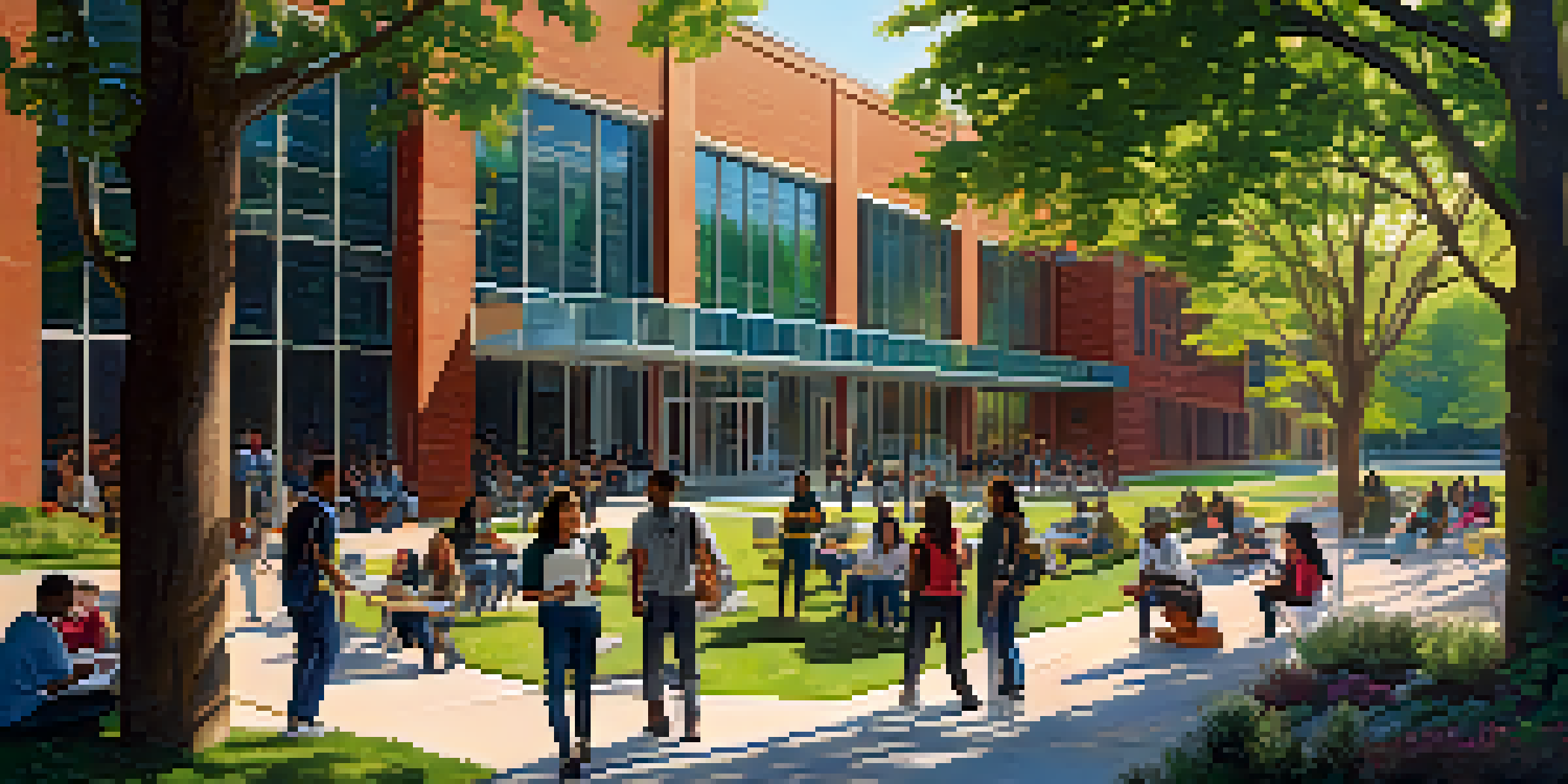The Role of Community Colleges in Detroit's Workforce Development

Understanding the Role of Community Colleges in Detroit
Community colleges serve as vital educational hubs, providing accessible training and education to diverse populations. In Detroit, these institutions play a crucial role in shaping the local workforce by offering programs tailored to the region's economic needs. They bridge the gap between high school and higher education, making advanced learning more achievable for many students.
Community colleges are not just an educational pathway; they are a lifeline for many in our communities, providing the skills and knowledge needed to succeed in today's economy.
These colleges not only focus on academic programs but also emphasize vocational training that aligns with industry demands. By offering courses in fields such as healthcare, technology, and manufacturing, community colleges equip students with the skills necessary for today’s job market. This alignment with local employers ensures that graduates are ready to contribute immediately upon entering the workforce.
Moreover, community colleges foster partnerships with local businesses to create internship and job placement opportunities. This collaboration provides students with real-world experience while helping companies find qualified candidates. As a result, community colleges become instrumental in enhancing both individual careers and the broader economy in Detroit.
Building Skills for In-Demand Careers
One of the primary functions of community colleges is to prepare students for in-demand careers, particularly in sectors that are thriving in Detroit. Programs often focus on areas such as information technology, healthcare, and skilled trades, which are essential to the city's economic revitalization. By tailoring the curriculum to meet industry standards, these colleges ensure that students gain relevant skills.

For instance, the healthcare sector in Detroit has seen significant growth, creating a demand for trained professionals such as nurses and medical technicians. Community colleges respond by offering specialized programs that allow students to gain certifications and hands-on experience. This not only positions students for immediate employment but also helps meet the needs of local healthcare providers.
Key Role in Workforce Development
Community colleges in Detroit are essential in preparing a skilled workforce by offering programs aligned with local industry needs.
Similarly, workforce training programs in information technology help fill the skills gap in this rapidly evolving field. Students learn about software development, cybersecurity, and data analysis, equipping them with the knowledge necessary to thrive in tech roles. By aligning educational offerings with market demands, community colleges play a pivotal role in preparing Detroit's workforce for future challenges.
Supporting Workforce Diversity and Inclusion
Community colleges are committed to creating an inclusive environment that supports workforce diversity. In Detroit, where the population is rich in cultural backgrounds, these institutions provide educational opportunities to underrepresented groups. By doing so, they help ensure that everyone has a fair chance to succeed in the job market.
Education is the most powerful weapon which you can use to change the world.
Many community colleges offer targeted programs to assist minority students, single parents, and returning veterans. These initiatives often include mentorship, financial aid, and flexible class schedules, making education more accessible. This support system empowers students who may face barriers in pursuing higher education.
Additionally, diversity enriches the learning environment, bringing various perspectives that can enhance collaboration and innovation. By fostering a diverse student body, community colleges not only prepare individuals for the workforce but also contribute to a more equitable economy in Detroit, benefiting the community as a whole.
Creating Pathways to Further Education
Community colleges serve as a stepping stone for many students who aspire to further their education. They provide an affordable option for individuals to complete their general education requirements before transferring to four-year universities. This pathway is particularly valuable for students who may not have a clear plan when they first enter college.
For example, students can earn an associate degree in a specific field and then easily transition to a bachelor's program. Many community colleges have transfer agreements with local universities, ensuring a smooth process for students. This connection not only helps students save money but also allows them to maximize their educational opportunities.
Promoting Diversity and Inclusion
These institutions foster an inclusive environment, providing educational opportunities for underrepresented groups to enhance workforce diversity.
Moreover, community colleges often offer support services such as academic advising and transfer workshops. These resources guide students in selecting the right courses and navigating the transfer process. By creating clear pathways to further education, community colleges empower students to achieve their long-term career goals.
Economic Impact of Community Colleges on Detroit
The economic impact of community colleges in Detroit extends beyond individual students; it has far-reaching implications for the entire city. By providing a skilled workforce, these institutions contribute to the growth of local industries and attract new businesses. A well-educated workforce is a key factor in economic development, making Detroit a more competitive place for investment.
Moreover, community colleges help reduce unemployment rates by offering targeted training programs that meet the specific needs of local employers. When businesses can find qualified workers, they are more likely to expand operations or invest in the area. This creates a positive feedback loop where education drives economic growth, which in turn leads to more educational opportunities.
Additionally, the presence of community colleges can enhance community engagement and stability. Graduates often stay in the area, contributing to the local economy through spending and taxes. This creates a vibrant community that supports not only the workforce but also the overall quality of life in Detroit.
Challenges Facing Community Colleges in Detroit
Despite their critical role, community colleges in Detroit face several challenges that can hinder their effectiveness. Funding is often a significant issue, as many institutions rely on state and federal support, which can fluctuate. Limited resources can affect the quality of programs offered and the ability to provide adequate support services.
Moreover, community colleges must continuously adapt to the changing needs of the workforce. As industries evolve, so too must the training programs and curricula. This requires constant investment in faculty development and technology, which can be challenging without sufficient funding.
Pathways to Further Education
Community colleges create accessible pathways for students to transition to four-year universities, maximizing their educational opportunities.
Additionally, attracting and retaining students is an ongoing concern. Many potential students may be unaware of the opportunities available at community colleges or may face barriers such as transportation and childcare. Addressing these challenges is essential for community colleges to continue fulfilling their mission in Detroit.
Future of Community Colleges in Detroit's Workforce Development
Looking ahead, community colleges in Detroit are poised to play an even more significant role in workforce development. As the city continues to evolve, the demand for skilled labor is expected to grow, and these institutions are well-positioned to meet that need. By enhancing partnerships with local industries, they can ensure that their programs remain relevant and impactful.
Furthermore, embracing technology will be essential for community colleges to reach a broader audience. Online programs and hybrid learning opportunities can attract non-traditional students who may not be able to attend classes on campus. This flexibility can open doors for many individuals seeking education and training.

Ultimately, the future success of community colleges in Detroit hinges on their ability to adapt and innovate. By staying responsive to the needs of students and employers, these institutions can continue to foster economic growth and empower individuals to achieve their career aspirations.